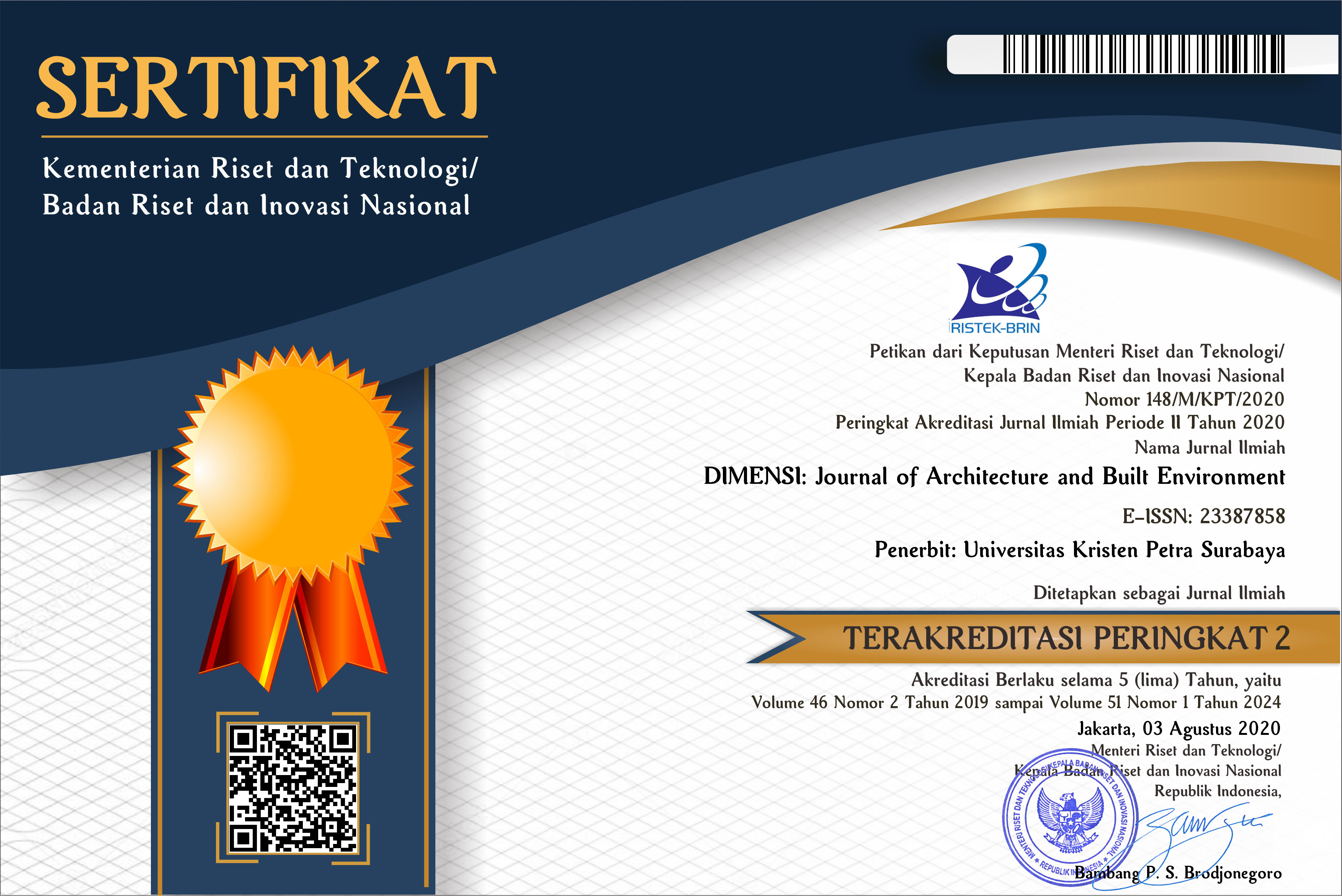SUSTAINABLE WASTE MANAGEMENT OF TRADITIONAL CRAFT INDUSTRY IN LOPATI TOURISM VILLAGE, YOGYAKARTA
 :
:
https://doi.org/10.9744/dimensi.43.2.123-130
Keywords:
Ecotourism, rural tourism, waste management, environmental impact, community participation.Abstract
Ecotourism has been growing in Yogyakarta that can be seen through the development of rural tourism. The development of rural tourism has positive impact to improve local community’s welfare nevertheless, it has also negative impact onto environmental carrying capacity. Lopati tourism village is located in Bantul, Yogyakarta, relying on traditional craft industry as tourism attraction. Traditional crafts are livelihood of local residents, so that environmental management efforts become part of their daily lives. This research aims to review the roles of community to reduce environmental impacts through analyzing the waste management of traditional craft industry. It used case study method to examine the uniqueness of Lopati village. Data collecting used participatory action research techniques in order to gather information from residents. Community participation acted to anticipate negative impact on development of rural tourism. Waste management in Lopati committed by local residents not to cause adverse environmental impacts. The result show that waste management based on community participation supports the development of rural tourism.
Downloads
References
DISPARBUD-Bantul (2013). Data Desa Wisata Kabupaten Bantul. Bantul: Pemerintah Kabupaten Bantul. [CrossRef]
Edmonton, C.O. (2010). Sustainable Waste Management. Retrieved October 17, 2016, from https://www.edmonton.ca/:https://www.edmonton.ca/city_government/documents/PDF/Discussion_Paper_10_Sustainable_Waste_Management.pdf [CrossRef]
KESMAS (2015). Pengertian BOD, COD, TSS, pada Air Limbah. Retrieved October 20, 2016, from http://www.indonesian-publichealth.com/ pengertian-bod-cod-tss-pada-air-limbah/ [CrossRef]
Mikkelsen, B. (2001). Metode Penelitian Partisipatoris dan Upaya - upaya Pemberdayaan (terjemahan) (2nd ed.). Jakarta: Yayasan Obor Indonesia. [CrossRef]
Nugroho, I. (2011). Ekowisata dan Pembangunan Berkelanjutan. Yogyakarta: Pustaka Pelajar. [CrossRef]
Purwaningsih, A., Herawati, A. & Vitasurya, V. R. (2015). Model Pemberdayaan Desa Wisata Berbasis Pelestarian Lingkungan Dalam Upaya Peningkatan Kesejahteraan Masyarakat Di Provinsi Daerah Istimewa Yogyakarta. Yogyakarta: Universitas Atma Jaya Yogyakarta. [CrossRef]
Shamshiry, E., Nadi, B., BinMokhtar, M. & Komoo, I. (2011). Integrated Models for Solid Waste Management in Tourism Regions: Langkawi Island, Malaysia. Journal of Environmental and Public Health , p.1-5. [CrossRef]
Tchobanoglous, G. & Kreith, F. (2002). Handbook of solid waste management. New York: McGRAW-HILL. [CrossRef]
UNESCO (2001). UNESCO Universal Declaration on Cultural Diversity. Retrieved March 29, 2014, from http://www.portal.unesco.org/ev. php.htm [CrossRef]
Unnisa, S. A. & Rav, S. B. (2012). Sustainable Solid Waste Management. Canada: Apple Academic Press. [CrossRef]
Wadawi, Bresler, J. & Okech, R. (2008). Using hotel quality differentiating factors to boost Kenya's destination competitiveness. International Journal of Tourism and Travel, 1(1), p.22-32. [CrossRef]
Wadawi, J., Bresler, N. & Okech, R. (2009). The Role of hotels in the consumption of cultural tourism in Kenya. Journal of Tourism Studies and Research, 8(8), p. 34-39. [CrossRef]
WTO. (1999). Global Code of Ethic for Tourism. Santiago, Chile. [CrossRef]
Zaman, A. (2012). Comparative Study of Municipal Solid Waste Treatment Technologies Using LIfe Cycle Assessment Method. In S. A. Unnisa, & S. B. Rav, Sustainable Solid Waste Management (p.1-14). Canada: Apple Academic Press. [CrossRef]
Downloads
Published
How to Cite
Issue
Section
License
Authors who publish with this journal agree to the following terms:
- Authors retain copyright and grant the journal right of first publication with the work simultaneously licensed under a Creative Commons Attribution License that allows others to share the work with an acknowledgement of the work's authorship and initial publication in this journal.
- Authors are able to enter into separate, additional contractual arrangements for the non-exclusive distribution of the journal's published version of the work (e.g., post it to an institutional repository or publish it in a book), with an acknowledgement of its initial publication in this journal.
- Authors are permitted and encouraged to post their work online (e.g., in institutional repositories or on their website) prior to and during the submission process, as it can lead to productive exchanges, as well as earlier and greater citation of published work (See The Effect of Open Access).

















